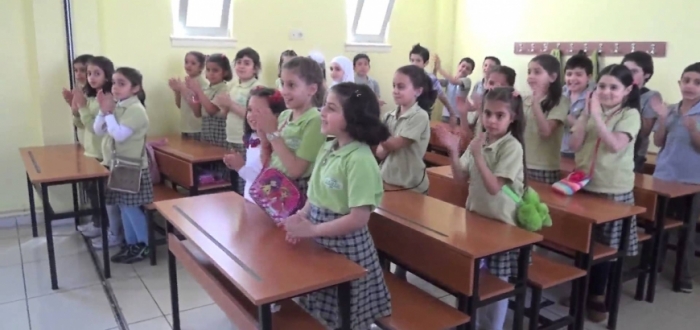The Turkish Education Ministry has prepared a road map aiming to complete education for Syrian refugee children, whose families have been forced to migrate to Turkey because of the ongoing unrest in their country.
Officials in the ministry said in their statements that the ministry had sent the roadmap the 81 Turkish provinces to be a guide around the steps that the provinces will take in the schools linked to the education directorates there. It includes a comprehensive plan around the registration of Syrian students (those who have obtained temporary protection and international protection and who have obtained Turkish citizenship and have not sufficiently mastered the Turkish language) in the government and private schools connected to the ministry during the 2016-2017 academic year.
The ministry plans to take necessary measures so that all students who live in Turkey obtain a good and solid education, regardless of the status of their residence.
Department in the Education Ministry
The “General Directorate for Lifelong Education” in the ministry under the head of the Education Department for Emergencies and Migration was founded as an extension of the continuing work for Syrian children four years ago.
The ministry aims to register in school Syrian children who have not been previously registered or who have left their schools because of psychological or physical trauma, because of economic reasons, or because of the conditions of the war in their country. The program will give students psychological and guidance consultation services in the schools with the aim of raising awareness about administrative and education staff in the schools so that the Syrian children are not subjected to isolation, exclusion or accusations, and to achieve harmony in the educational environment.
The primary schools will open in the temporary education centers (in the camps) which have adequate facilities. If the facilities are not adequate, halls will be established in connection with the closest primary school and the ministry’s courses will be taught there.
If there is a need, after the agreement of the province, middle schools will be set up in the temporary education centers or halls connected with the nearest middle school, where the ministry’s educational curriculum will be used.
In connection with Syrian students who receive their education in the ministry schools, an optional educational program will be implemented in their language outside the school hours, with the aim of preserving their language and culture. One of the ministry’s directorates will take on the task of coordinating this program.
From another angle, the ministry will appoint new teachers before the start of the coming school year in parallel with an increase in the rate of students in the schools.
Curricula for First Grade Students
The ministry will implement reading and writing courses for Syrian students in the first grade, while Syrian students in other levels will receive courses in Turkish language skills. Regarding students who have a weak level of Turkish language, Turkish language courses will be given in training centers.
For students at the primary and middle level whose education level is insufficient because they have been out of school for a long time, a program and courses for strengthening skills in the required areas will be opened to support them, outside school hours at the weekend and the mid-year and summer holiday, with the aim of harmonizing their level of progress.
They Will Learn the Turkish Language
The Syrian students whose level of Turkish language is weak will be distributed in study halls in a balanced way to merge them with their peers and so that they learn the Turkish language well.
This article was translated and edited by The Syrian Observer. Responsibility for the information and views set out in this article lies entirely with the author.


